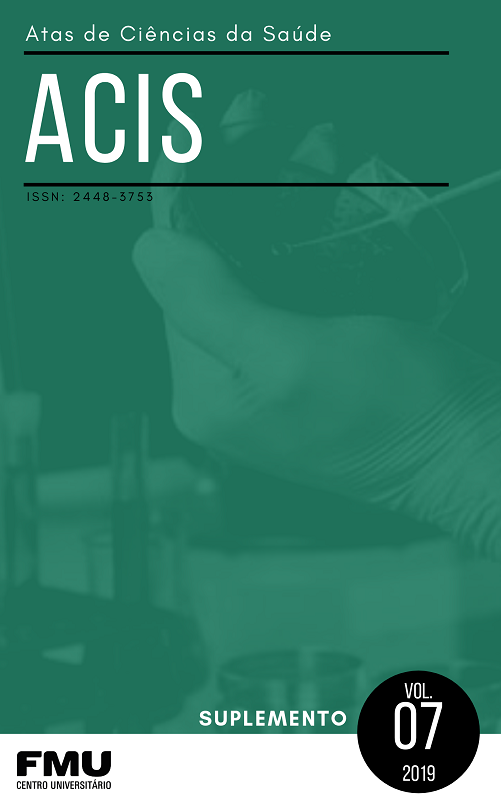SIMULAÇÃO COMO METODOLOGIA NA FORMAÇÃO DE DISCENTES EM ENFERMAGEM NO ESTÁGIO FINAL DA GRADUAÇÃO
Keywords:
Simulation, Nursing Education, Nursing.Abstract
Objective to describe the experience of nursing teachers in the planning, organization and conduction of a realistic simulation scenario. The construction of scenario involved the learning objectives "to carry out the first prenatal consult of a pregnant woman" and "Develop communication skills". Briefing and Debriefing was carried out with the actors and nursing students. During the scenario it was observed that the class was attentive. It was realized that the insertion of one of the students in the controlled environment provided a collective learning. The use of simulated scenario comprised a significant tool in the development of the student. It prepared the students for real clinical situations, contributing to their professional formation.
References
REFERÊNCIAS
Schiavenato M. Reevaluating simulation in nursing education: beyond the human patient simulator. J Nurs Educ 2009. 48(7):388-94.
Ventura CAA, Mendes IAC, Wilson LL, Godoy S, Tamí-Maury I, Zárate-Grajales R, et al. Global health competencies according to nursing faculty from Brazilian higher education institutions. Rev Latino-Am Enfermagem 2014;22(2):179-86.
Sanino, GEC. O uso da simulação em enfermagem no Curso Técnico de Enfermagem. J. Health Inform 2012;4(Número Especial - SIIENF 2012):148-51.
Garbuio DC, Oliveira ARS, Kameo SY et al. Simulação clínica em enfermagem: relato de experiência sobre a construção de um cenário. Rev enferm UFPE on line 2016;10(8):3149-55.
Melo MCB, Liu PMF, Magalhães AMPB et al. A simulação no ensino da graduação. In Scalabrini Neto, A. Simulação realística e habilidades na saúde. 1ed. Rio de Janeiro: Atheneu; 2017.
Spindola T, Progianti JM, Penna LHG. Opinião das gestantes sobre acompanhamento da enfermeira obstetra no pré-natal de um Hospital Universitário. Ciencia y Enfermeria 2012;xviii(2):65-73.
Kirwin J, Greenwood KC, Rico J, Nalliah R, DiVall M. Interprofessional Curbside Consults to Develop Team Communication and Improve Student Achievement of Learning Outcomes. American Journal of Pharmaceutical Education 2017;81(1):15.
Costa RRO, Medeiros SM, Martins JCA, Menezes RMP, Araújo MS. O uso da simulação no contexto da educação e formação em saúde e enfermagem: uma reflexão acadêmica. Revista espaço para a saúde 2015;16(1):59-65.
Fabri RP, Mazzo A, Martins JCA, Fonseca AS, Pedersoli CE, Miranda FBG et al. Development of a theoretical-practical script for clinical simulation. Rev. esc. enferm. USP 2017;51:(e03218).
Lapkin S, Levett-Jones T. A cost–utility analysis of medium vs. high-fidelity human patient simulation manikins in nursing education. J Clin Nurs 2011;20(35):43-52.
Coutinho V, Martins JCA, Pereira MF, Mazzo A. Feedback e debriefing. In Scalabrini Neto, A. Simulação realística e habilidades na saúde. 1ed. Rio de Janeiro: Atheneu; 2017.
Santos ARG, Mazzo A, Martins JCA, Coutinho VRD, Jorge BM, Mendes IAC. Validação para a língua portuguesa da Debriefing Experience Scale. Rev Bras Enferm 2016;69(4):705-711.
Prego J, Gerolami A, Más M, Morosini F, Cedrés A, Rocha S et al . Simulación de alta fidelidad en emergencia pediátrica: primera experiencia en la formación de posgrados y residentes de Pediatría. Rev Méd Urug 2014;30(4):247-254.
Kardong-Edgren SE, Starkweather AR, Ward LD. The integration of simulation into a clinical foundations of nursing course: student and faculty perspectives. Int J Nurs Educ Scholarsh 2008;5(Article 26).
Berragan L. Simulation: an effective pedagogical approach for nursing? Nurse Educ Today 2011;31(7):660-3.
Baptista RCN, Martins JCA, Pereira MFCR, Mazzo A. Simulação de Alta-Fidelidade no Curso de Enfermagem: ganhos pelos estudantes. Rev Enf Ref 2014;IV(1):135-44.
Mendes MGS, Martins CA, Oliveira C, Silva MJ, Vilaça S. Contributos da aprendizagem baseada em problemas no desempenho de estudantes de enfermagem em ensino clínico. Rev de Formación e Innovación Educativa Universitaria 2011;5(4):227-40.
Almeida DM, Vaz DR, Prado C. Aprendizagem significativa no contexto da enfermagem. In: Prado: Práticas pedagógica em enfermagem: processo de reconstrução permanente. 1 ed. São Caetano, do Sul. 2013
Downloads
Published
Issue
Section
License
Autores que publicam nesta revista concordam com os seguintes termos:
- Autores mantém os direitos autorais e concedem à revista o direito de primeira publicação, com o trabalho simultaneamente licenciado sob a Licença Creative Commons Attribution que permite o compartilhamento do trabalho com reconhecimento da autoria e publicação inicial nesta revista.
- Autores têm autorização para assumir contratos adicionais separadamente, para distribuição não-exclusiva da versão do trabalho publicada nesta revista (ex.: publicar em repositório institucional ou como capítulo de livro), com reconhecimento de autoria e publicação inicial nesta revista.
- Autores têm permissão e são estimulados a publicar e distribuir seu trabalho online (ex.: em repositórios institucionais ou na sua página pessoal) a qualquer ponto antes ou durante o processo editorial, já que isso pode gerar alterações produtivas, bem como aumentar o impacto e a citação do trabalho publicado (Veja O Efeito do Acesso Livre).





